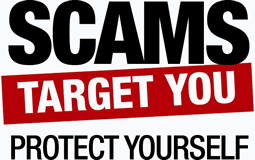Scams Target You - Protect Yourself
Newer Articles >It’s Fraud Awareness Week here until the 9th of March, so plenty is going on in regards to helping people educate themselves, and report scams to protect others.
ScamWatch New Zealand has provided some useful examples of people being scammed which is always worth reading.
If you aren’t much of a reader, here’s the short version.
There are no guaranteed get-rich-quick schemes – the only people who get rich are the scammers.
• DON’T respond to offers, deals or requests for your details. Stop. Take time to independently check the offer.
• NEVER send money or give credit card, account or other personal details to anyone who makes unsolicited offers or requests for information.
• DON’T rely on glowing testimonials: find solid evidence from independent sources (not those provided with the offer).
• NEVER respond to out of the blue requests for your personal details.
• ALWAYS type in the address of a website of a bank, business or authority in which you are interested - it’s safer.
• NEVER click on a link provided in an unsolicited email as it will probably lead to a fake website designed to trap you.
• NEVER use phone numbers provided with unsolicited requests or offers as they probably connect you to fakes who will try to trap you with lies.
• ALWAYS look up phone numbers in an independent directory when you wish to check if a request or offer is genuine.
And if you want some further advice, here’s what I would add.
Be wary of “trusted” sources. Your bank will not send you an email in which they ask you to confirm any personal details, your bank should not call you to confirm your credit card or other bank card PIN numbers.
When scammers attempt to make contact pretending to be a trusted source, they often do so with a false sense of urgency. If you notice this high pressure technique be wary.
This policy can also extend to many other situations outside of the internet, so if you're being pressured into making decisions suddenly and without full and proper thought, you should take a cautious approach.
Be extremely suspicious of money orders. While it can be said that money orders are a legitimate tool for financial exchanges, fake money orders are a very common medium for fraud, particularly with auction fraud.
A bank will often accept a money order, but then when it's discovered to be fraudulent, you are the one responsible for the amount. Money orders are not covered by the same limited liability laws that we enjoy with our credit cards.
In fact the limited liability laws make credit cards far safer than money orders for transactions.
Check your bank account and credit card statements frequently. Be on the look out for purchases or transactions that you may not be familiar with.
Do not judge reliability by how professional a website looks. It's relatively easy and costs very little to create, register, and promote a website.
Remember that people and companies you communicate through the internet with are not always what they seem.
If it sounds too good to be true, it probably is. Ask yourself
“How could I win a lottery prize if I haven't bought a ticket ?”
“How would Bill Gates share his fortune with me, if I forward this email ?”
“Why would the lost prince of the little known country of Scamartistan share his millions with me ?”
If you win something you should not pay anything to receive your prize. This technique is very common, and is also known as Advance Fee Fraud, or 419 Fraud.
Eventually the scammer will reveal that in order for the arrangement to proceed a smaller amount of money is required to be paid first.
Be cautious of Internet Dating.
Unfortunately scam artists have begun using Internet Dating sites to groom people over a longer period of time, eventually requesting money whether it be for travel
(to be together) or for some other deeply emotional issue, such as a family member requiring medical attention.
And my final kicker.
NEVER EVER USE WESTERN UNION TO SEND MONEY TO SOMEONE YOU DO NOT KNOW.
Western Union is the bread and butter medium for scammers, why this point doesn’t get driven home I don’t know. Time and time again victims refer to Western Union as being the method of their loss.
ScamWatch New Zealand really dropped the ball with this , though it shouldn’t come as any surprise The National Manager of the eCrime Laboratory for New Zealand Police,
did once suggest on national television that Western Union as a safer service to use.






